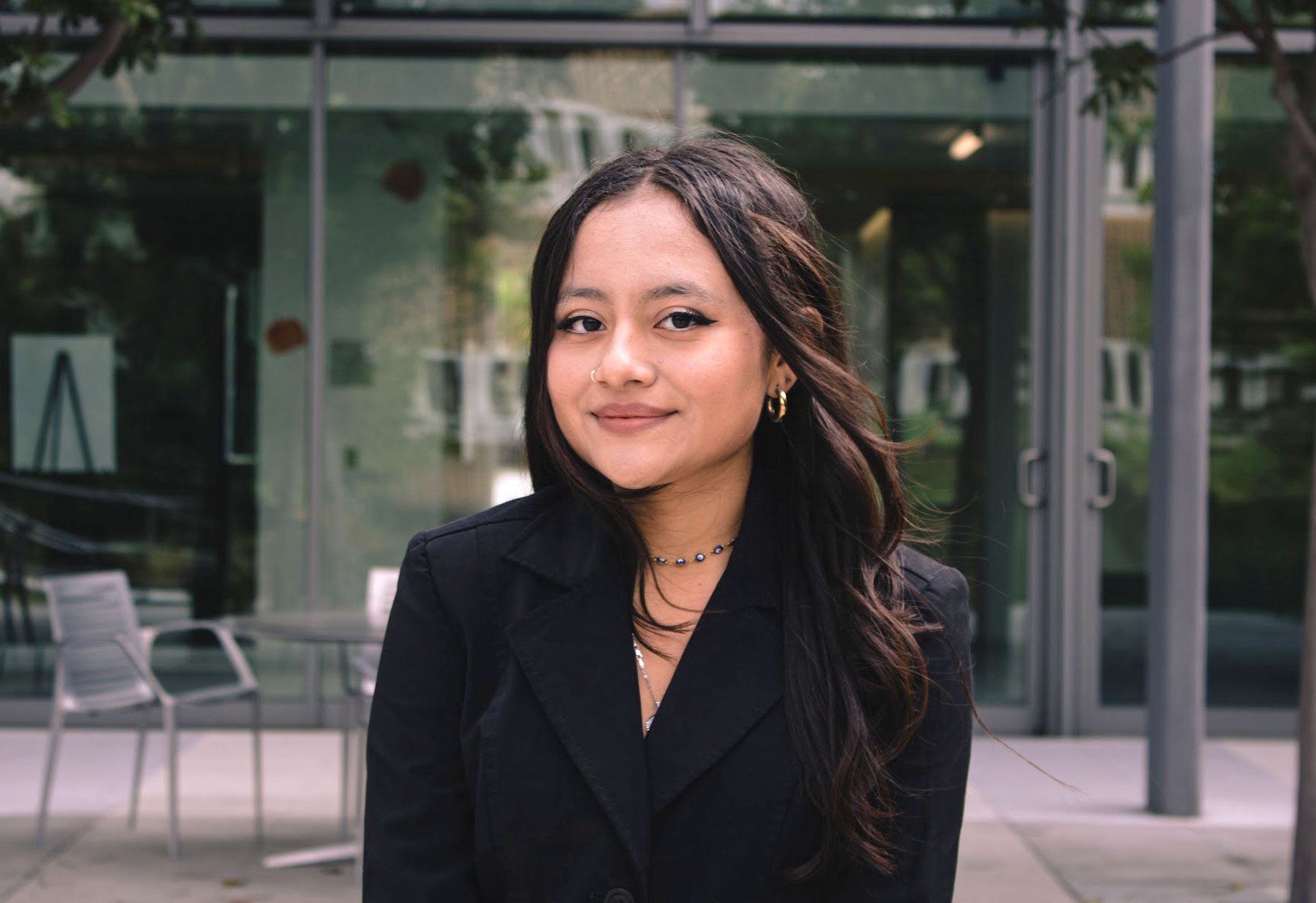
Eylenne Diaz ’25 strongly believes that all voices, regardless of socioeconomic standing or immigration status, should be heard. In fall 2022, her favorite class was “Introduction to Chicana/o and Latina/o Studies” because it “helped me be more aware of the practices that have pushed marginalized groups aside, and how we can deconstruct these very same systems.”
Diaz knows what she’s talking about. Her parents are both immigrants from Mexico and neither speaks English fluently. Since Diaz and her two younger brothers were born, however, her parents have worked hard to provide a good life for their children. Her father, an industrial painter, worked back-to-back shifts when the kids were young, and her mother sometimes sold homemade tamales to help make ends meet. Both parents, in spite of their own lack of college degrees and financial resources, enthusiastically encouraged Diaz to pursue higher education and have consistently been her biggest supporters.
“From a young age, my parents always said if I wanted a life different from theirs, I’d have to go to school,” Diaz relates. “I thought I’d have to become a doctor or an engineer, but they encouraged me to find something I’m passionate about because that’s what I’ll do best in.”
Initially, her parents urged her to attend school close to home in San Jose to reduce costs. But Diaz wanted to establish a degree of independence, and she was drawn to LMU’s intimate size, dynamic location, and the Jesuit values she was already familiar with thanks to attending a Catholic high school and middle school. “It felt like LMU wanted to make well-rounded students instead of just students who are the best in their field,” says Diaz. “I was already aware of the Catholic values of working to change the world and make a difference. I thought here, there would be more opportunities to apply what I learned in class to the real world, to make a change.”
Once the choice was made, the Diaz family knew they’d have to work extra hard to make an LMU education happen for their daughter. Diaz’s mother even went back to selling tamales to earn some extra cash. She only had to do it for a couple of weeks, however, before enough financial aid came through to enable her daughter to move forward with enrollment. Since then, Diaz has benefited from an array of student scholarships, which have significantly eased the financial burden on her family. She is especially appreciative of the Arrupe Scholarship, a competitive academic scholarship named after Father Pedro Arrupe, an influential priest who helped shaped Jesuit education as superior general of the Society of Jesus. The scholarship is renewable for four years and has provided the Diazes with a steady source of support.
“[Politics] taught me a lot about the power of one’s voice and how loud or silent we choose to be. I like to give myself hope in thinking I can make life a little better for those around me.”
Eylenne Diaz
A first-year political science class made Diaz realize that her passion lay with politics. “What I like the most about politics is its very real implications in everybody’s life,” says Diaz. “It’s taught me a lot about the power of one’s voice and how loud or silent we choose to be. I like to give myself hope in thinking I can make life a little better for those around me.” Diaz thinks she might begin her career by working in local government in San Jose.
At LMU Diaz has benefited from the support systems provided by First To Go, the university’s comprehensive program for first-generation students. She has also immersed herself in a variety of meaningful and fulfilling extracurricular activities, such as El Espejo, a mentoring program that connects LMU students with high-risk students at Lennox Middle School. “I feel like it helped me help other people, but it also helped me help myself because I joined my first year when I was struggling a bit being away from home,” Diaz says. “Establishing bonds with those kids reminded me of why I’m doing this — for people that look like me to be like, yeah, I can do this too. It reminded me of my goal, and it also reminded me of my own siblings back home.”
Now that she’s looking forward to life after college, another program that has been critical to Diaz’s development is the McNair Scholars Program, a federal TRIO program that prepares first-generation and other under-represented undergraduate students for doctoral studies through involvement in research and other scholarly activities. “From connecting us to research opportunities, refining resumes and personal statements, to even taking us on visits to graduate schools, McNair goes above and beyond to support us,” said Diaz. “McNair has had a profound impact on my academic journey by providing me with a community of like-minded peers and experienced mentors. I look forward to continuing to be part of this community for the rest of my time at LMU and beyond.”
Ultimately for Diaz, everything comes back to family and community. In addition to her parents and siblings, she cites Guatemalan human rights activist and Nobel Peace Prize laureate Rigoberta Menchú Tum as an inspiration. “Her work is really cool because she didn’t come from a highly educated background, but she still found a way to make her voice heard. I think that if you have enough conviction, even without having that background you can still make a difference — by staying connected to the community that you’re trying to help the most and using that as a force to keep going and keep fighting.”
To support LMU First To Go programs and/or student scholarships, you can make a gift here, or contact Megan Olson ’09, senior director of development, at 310.338.5922, megan.olson@lmu.edu.



